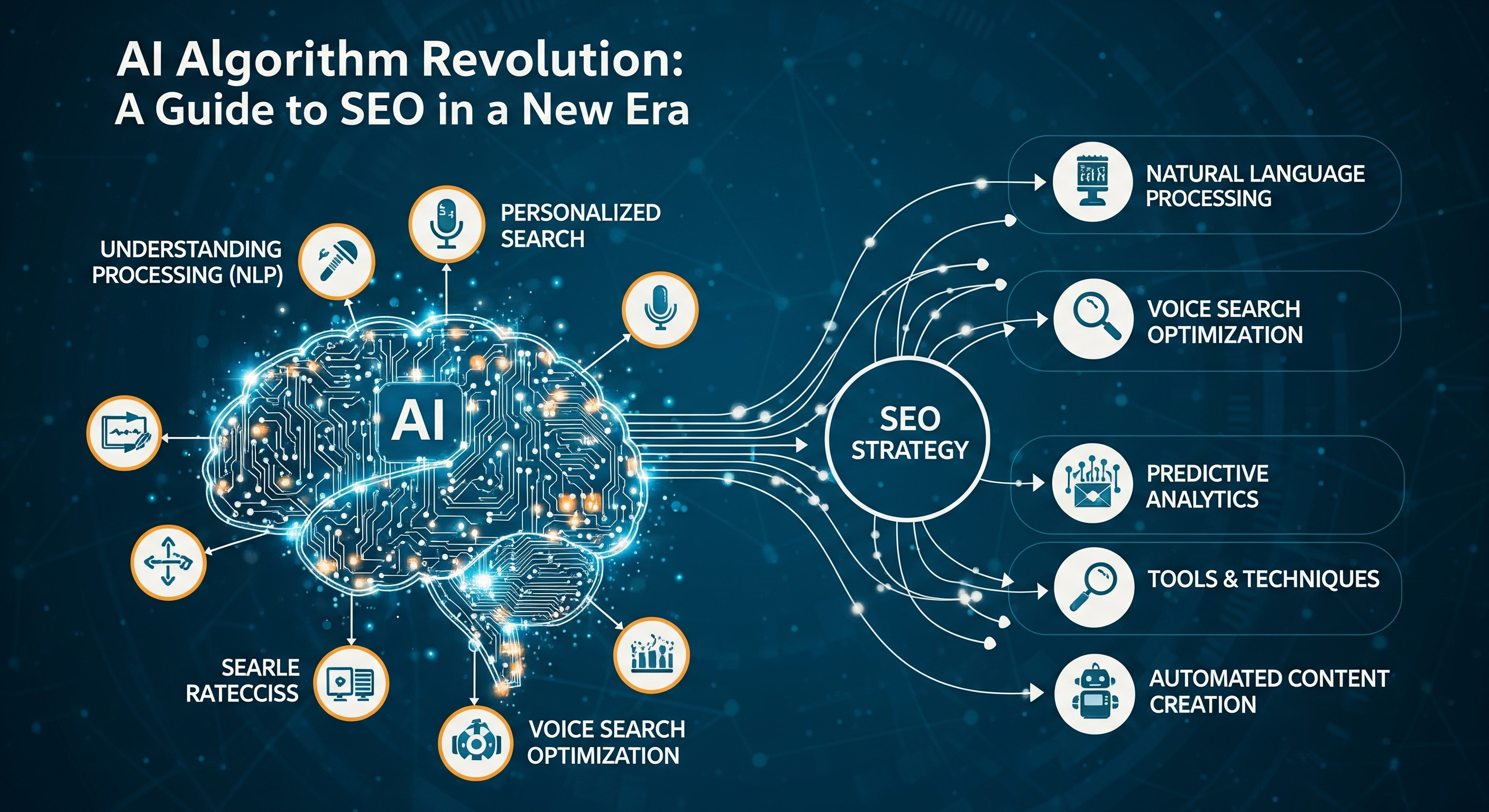
Welcome to the new frontier of digital marketing. The days of simply stuffing a webpage with keywords are long gone. Today, the digital landscape is dominated by a powerful, evolving force: AI ranking algorithms. These sophisticated systems are no longer just indexing keywords; they're analyzing intent, understanding context, and prioritizing content that truly serves the user. For businesses that rely on organic traffic, this shift isn't just a trend, it's a complete revolution in how we approach SEO.
This blog post will take a deep dive into the inner workings of AI ranking algorithms, explore how they influence search results, and, most importantly, provide actionable strategies to ensure your business not only survives but thrives in this new era of search.
At its core, an AI ranking algorithm is a complex set of rules and machine learning models that search engines use to determine the order of web pages on a Search Engine Results Page (SERP). Think of it as a highly intelligent librarian who, instead of just cataloging books by title, reads every book, understands the author's intent, assesses its credibility, and then recommends the perfect book for each person's unique query.
Google’s original algorithm, PageRank, was a groundbreaking step, but it was a much simpler system. It was largely based on backlinks—a web page's authority was determined by the number and quality of other pages linking to it. Today, systems like Google's RankBrain and BERT use advanced machine learning and natural language processing (NLP) to go beyond simple keyword matching. They analyze user behavior, understand the semantic relationships between words, and contextualize a user's query in real-time. This means a search for "best shoes for running" is understood as an informational query about product recommendations, not just a simple search for pages containing those words.
The evolution from simple keyword matching to understanding human intent is the single most important factor shaping modern SEO. It’s a shift from optimizing for machines to creating content for humans, with the AI serving as the bridge between the two.
To truly understand how AI influences search results, you need to look at the three main factors that these new algorithms prioritize. These are the cornerstones of the new digital ecosystem.
The days of focusing solely on exact-match keywords are over. Modern AI algorithms are built on semantic search, which means they focus on the meaning and context behind a user's query, not just the individual words.
This is a monumental change. A search for "how to cook a perfect steak" is no longer just a search for pages with that exact phrase. The AI understands that the user wants to know about different cooking methods, internal temperatures, seasoning, and resting techniques. A high-ranking page will cover all of these related topics comprehensively. This means your content needs to be rich in related concepts and address a wide range of sub-questions a user might have.
Google’s emphasis on E-E-A-T (Experience, Expertise, Authoritativeness, and Trustworthiness) has never been more critical. AI algorithms are designed to identify and prioritize content from credible, reliable sources. This is especially true for "Your Money or Your Life" (YMYL) topics, such as finance, health, or legal advice, where inaccurate information could be harmful.
AI analyzes a variety of signals to determine a page’s E-E-A-T. These signals include:
In the age of AI, building your brand's reputation and establishing yourself as a trustworthy authority is a powerful SEO strategy.
AI algorithms are keenly aware of how users interact with your website. They monitor signals like dwell time (how long a user stays on a page) and bounce rate (the percentage of visitors who leave a site after viewing only one page). If a user clicks on your page and immediately returns to the search results, it signals to the algorithm that your content wasn't what they were looking for.
A positive user experience is now a direct ranking factor. This includes:
By creating a fast, intuitive, and easy-to-read website, you are not just pleasing your customers; you are directly influencing your search rankings.

The good news is that the shift toward AI-driven algorithms is a massive opportunity for businesses willing to adapt. By focusing on creating genuinely valuable content and a great user experience, you can position your brand for long-term success.
Here are some key strategies to get you started:
Instead of creating individual blog posts for every long-tail keyword, organize your content into "topic clusters." This model involves a central "pillar page" that provides a comprehensive overview of a broad topic, such as "digital marketing strategies." This pillar page then links to a series of more specific "cluster content" articles that delve into subtopics like "email marketing automation," "content strategy," or "SEO for beginners."
This structure demonstrates to AI algorithms that you are a topical authority, which significantly boosts your E-E-A-T and ranking potential.
AI algorithms are designed to reward content that provides comprehensive, authoritative answers. To rank highly, your content needs to be more than just a surface-level overview.
The rise of generative AI in search engines (like Google's AI Overviews) has created a new challenge and opportunity. These AI-generated summaries often appear at the top of the SERP, pulling information from high-ranking websites.
To get your content featured, you must structure it in a way that is easy for AI to "scrape" and understand.
Even the most brilliant content will fail to rank if your website has technical issues. Your technical SEO foundation is more important than ever.
The technical health of your site is the bedrock upon which all other SEO efforts are built.

The integration of AI into search isn't a threat to marketers; it's a clear signal that the future of SEO is a return to basics. The new rules of search reward businesses that prioritize their audience.
In this new ecosystem, a successful strategy is one that focuses on:
These are the same principles that have always driven successful businesses. AI has simply made it impossible to succeed without them.
AI ranking algorithms have fundamentally changed the rules of search. They have moved beyond simple keyword-matching to become sophisticated systems that understand user intent, evaluate content quality, and reward brands that prioritize a great user experience. Businesses that embrace this shift by creating authoritative, human-centric content will be the ones that win the game.
The digital landscape is a challenging place, but you don't have to navigate it alone. At Finch, we specialize in helping businesses like yours adapt and thrive. Our team of experts understands the nuances of AI-driven SEO and can help you develop a performance marketing strategy that delivers measurable results.
Ready to take your marketing to the next level and grow your business profitably?
Contact Finch for performance marketing that grows your business.
AI ranking algorithms are complex systems that use machine learning to sort web pages based on their relevance and quality for a user's search query. They go beyond simple keyword matching by analyzing the semantic meaning behind a query, assessing the expertise and authority of a source (E-E-A-T), and monitoring user behavior to ensure the results are helpful. The algorithms consider hundreds of factors, including page speed, mobile-friendliness, and the overall quality of the content to deliver the most useful and relevant results possible.
Older ranking algorithms were primarily based on keyword density and backlinks. They were more susceptible to manipulation, and SEO was often about "tricking" the algorithm. Newer AI-driven algorithms, like Google's RankBrain and BERT, are much more sophisticated. They focus on understanding the intent behind a user's query and the overall quality of a web page's content, making it much harder to rank without providing genuine value to the user. The new algorithms prioritize a user-first approach.
A business can tell if its website is optimized for AI algorithms by looking at key performance indicators. First, they should analyze their organic search traffic and rankings for a variety of conversational and long-tail keywords. Second, they should check their website's technical health, including page speed and mobile-friendliness, using tools like Google PageSpeed Insights. Finally, a business needs to evaluate its content for quality, comprehensiveness, and E-E-A-T signals, ensuring it provides direct, authoritative answers to user questions. A strong performance in these areas indicates a website is well-positioned for AI-driven search.
AI overviews are an evolving part of the search landscape, but in general, search engines like Google aim to provide proper attribution. To ensure your content is cited, focus on creating high-quality, unique, and authoritative content that is well-structured and uses schema markup. While you can't completely prevent your information from being used, building a strong brand reputation and becoming a trusted source makes it more likely that the AI will cite your work as the primary source, driving traffic and brand recognition back to your site.
Finch helps businesses navigate the AI-driven SEO landscape by providing expert performance marketing strategies. Our approach focuses on creating high-quality, comprehensive content, building brand authority, and optimizing the technical aspects of your website. We use a data-driven approach to identify opportunities, develop targeted content strategies, and ensure your site meets the stringent requirements of modern AI ranking algorithms. Our goal is to not only improve your search rankings but also to build a sustainable, profitable growth engine for your business.